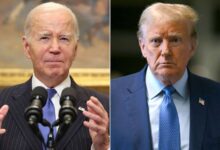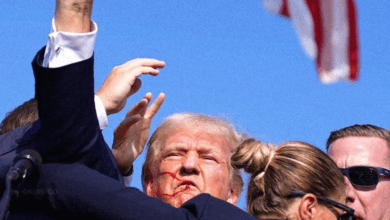How Trump Defeated Nikki Haley In South Carolina

Donald Trump’s big primary victory on Saturday over Nikki Haley in her home state of South Carolina was the result of a ruthless and methodical campaign to eliminate her as a threat, according to aides and people close to both campaigns.
Despite having already secured a string of primary victories, it was crucial for Trump to win South Carolina, a key early Republican primary state that often predicts the party’s nominee. Unlike in 2016, Trump was facing a rival who had won two terms as governor of the state and is still locally popular.
The plan was to isolate Haley politically by locking down endorsements from scores of officials in the state as quickly as possible to demonstrate publicly that she had no path to the presidency through South Carolina, aides with knowledge of the Trump campaign plan said.
Trump’s victory on Saturday was not a complete blowout but he still defeated her by a comfortable 20 percentage points on her home turf.
“We were facing a two-term governor. That necessitated a show of force. We needed endorsements to stop donors and voters taking a look at Nikki,” a senior Trump campaign adviser told Reuters on condition of anonymity.
Chris LaCivita, a co-manager of Trump’s campaign, said the series of big-name endorsements played a critical role in snuffing out the competition in the state.
LaCivita said another crucial part of Trump’s success was to harvest data on the thousands of voters who attended the former president’s rallies.
“What happens in the state after we’re on the airplane. That’s where the real work begins,” LaCivita said.
Working out of a nondescript office park in North Charleston, campaign staff have been toiling for months to use voter data to communicate regularly with potential voters. Trump used a similar game plan to win in Iowa and New Hampshire.
ENDORSEMENT WINDFALL
As recently as December, Haley was still saying publicly that South Carolina was where she would finally score a win over Trump and turn the nominating contest around. Instead, it may be remembered as the state where her campaign suffered its fatal blow.
By Jan. 24 – a month before the primary – Trump had secured the endorsements of 158 current and former South Carolina Republicans officials, including lawmakers, mayors and sheriffs. By this week Haley had received endorsements from one member of the U.S. House of Representatives, 11 current state lawmakers and two mayors.
“Those endorsements (of Trump) do matter. They are absolutely embarrassing in their numbers for Nikki Haley,” the Trump campaign adviser said.
“If you have the local police chief or a city council person evangelizing about President Trump at a barbecue or at a local meeting, it’s a force multiplier on our ground game and grassroots efforts,” the adviser said.
Spearheading the push to lock up endorsements was the state’s governor, Henry McMaster; Ed McMullen, Trump’s former ambassador to Switzerland and a veteran of South Carolina politics; and Justin Evans, a state operative who ran Haley’s first political campaign in 2010.
The influential South Carolina House of Representatives speaker, Murrell Smith, who endorsed Trump in August 2023, also played a key role in securing endorsements inside the State House, as did the state’s lieutenant governor, Pamela Evette.
McMullen said he and other Trump allies began sketching a plan to ensure the former president’s total dominance in the state as early as June 2022, months before Trump officially announced he was running for president that November. Haley declared her candidacy in February 2023.
Trump’s South Carolina surrogates began contacting every state House and Senate member in May 2023. Lawmakers who were reluctant to endorse Trump were invited to personal meetings with him when he flew into the state, either at airports or other venues.
“The president was very generous with his time, he met with numerous people, it made clear to people he was serious and very much wanted their support,” McMullen said.
For her part, Haley said publicly she was not bothered by the endorsements Trump received, although associates have spoken of a sense of betrayal that some high-profile allies deserted her.
Her effort relied on some 1,700 volunteers across the state, and she crisscrossed South Carolina aggressively in recent weeks.
“Just like when she ran for governor, Nikki is the outsider, conservative candidate,” said Olivia Perez-Cubas, a campaign spokesperson. “As governor, she signed pro-life legislation, cracked down on illegal immigration, and took on both parties over spending and transparency issues.”
Seeking endorsements is common practice in U.S. presidential politics, but securing so many played a significant role in South Carolina for Trump, given Haley’s ties to the state.
The former president employed similar tactics to try to force Florida’s governor, Ron DeSantis, out of the race. Trump highlighted his overwhelming advantage in endorsements in Florida to fuel the narrative that he was the runaway favorite to win the nomination. DeSantis ended his campaign in January.
‘DESIGNED FOR MAXIMUM IMPACT’
A much sought-after endorsement was that of Tim Scott, one of South Carolina’s U.S. senators and a onetime presidential rival to Trump who dropped out of the race in November.
Scott had been appointed to his Senate seat in 2013 by Haley when she was governor, so securing his endorsement over the woman who sent him to the U.S. Senate was a big prize, several donors and operatives close to both Trump and Haley said.
Trump had maintained a relationship with Scott for some time. In 2020, he called Scott’s mother on her birthday, a source close to Scott said. Toward the end of his presidency, Trump invited Scott and his mother to ride aboard Air Force One.
Trump called Scott shortly after the senator dropped out of the race, a person close to Trump said, while Trump allies kept talking to Scott about an endorsement.
One person close to Haley said she exchanged text messages with Scott after he dropped out, but never verbally discussed an endorsement. It is unclear why they never directly discussed the matter, but Scott and Haley’s relationship deteriorated over the course of a campaign during which both camps took jabs at one another, said the person.
At a rally in New Hampshire on Jan. 19, four days before the primary election there, Scott endorsed Trump, a big blow to Haley and her hopes in South Carolina.
Trump’s team made sure Scott was standing prominently alongside the former president at his New Hampshire victory rally on Jan. 23. Trump appeared triumphant, suggesting to Scott he “must really hate” Haley. Scott replied: “I just love you!”
Haley was not deterred.
Fueled by donor money she persisted with her insurgent campaign even as she seemed to acknowledge she faced certain defeat to Trump in her home state. Trump and his allies hoped that a loss on home ground would finally persuade Haley to quit the race, but she said on Saturday night she was not giving up and would continue her presidential campaign. (Reuters)






